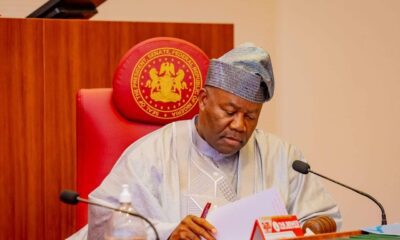Breaking News
REVEALED: Over 120 million young Nigerians aged 15-24 can’t read, write — Expert
Mandara emphasised that it was important that young Nigerians especially the girl-child had a minimum education of at least secondary school.

A Consultant Obstetrician Gynaecologist and Public Health Physician, Mairo Mandara, has disclosed that over 120 million young Nigerians aged 15-24 cannot read or write.
Of the number, she said 60 per cent which accounts for 72 million were females. She made this known at a round table engagement with traditional and interfaith leaders in advocating for partnership to improve human capital development through girl-child education, in Abuja.
Mandara, who also doubles as the Special Adviser and Coordinator, Sustainable Development, Partnerships and Humanitarian Response to Borno State Governor, said only 70 per cent of children entering primary education in sub-Saharan Africa complete their education.
Giving her presentation on the “significance of girls’ education in improving MNCH outcomes and fast-tracking Nigeria’s demographic transition” she revealed that in junior secondary schools, only 29.5 percent and in senior secondary schools only 13.9 per cent complete schooling.
She added that, “The capacity of our schools to accommodate graduates of primary education at the secondary level in Africa is currently at 36 per cent. Girls’ enrolment in secondary school is only between 30-35 per cent and completion about 14 per cent. Girls are particularly disadvantaged by societal dynamics that limit their participation in school.
“Nearly two-thirds of women in the North West and North East regions have no education, compared to less than 15 percent in the South-South. Drop-out rates are highest at the sixth grade of primary school and higher among girls than boys. Approximately 28 percent of girls between the ages of 15–19 are already married. 23 per cent of girls aged 15-19 years are already mothers or pregnant with their first child.”
Mandara emphasised that it was important that young Nigerians especially the girl-child had a minimum education of at least secondary school.
This was she explained that improving girls’ education can lead to large changes, the empowerment of women and can have major effects on economic and social development.
According to her, “Studies have documented how education improves maternal and child health and improve the lives of women, children and families. Each year of secondary education reduces the likelihood of marrying as a child before the age of 18 by five percentage points or more.
“One extra year of schooling increases an individual’s earnings by up to 10 percent. A child born to a mother who can read and write is 50 percent more likely to survive past the age of 5.
“Women that have secondary education have higher rates of attending antenatal care, hospital delivery, immunize their children and seek medical care when they or their family are sick, use family planning and take more informed decision about life.
“Completion of Primary School has no statistically significant impact. A child born to a mother who can read and write is 50 percent more likely to survive past the age of 5, and that child is more likely to go to school. An educated child also does better financially.”
To this end, she urged fathers to take the lead by encouraging parents to ensure every child, especially the girl child at least completes secondary school.
Mandara said, “Our fathers, the ball is in your court. We need you to use your influence and ensure every ward has at least one full secondary school from JSS to SSS. Advocate for policy to make completion of secondary school the minimum basic education, not JSS as this has no significant impact on the lives of girls and improvement in maternal and child health. Please take the lead and improve the future of Nigeria and our communities.”
















